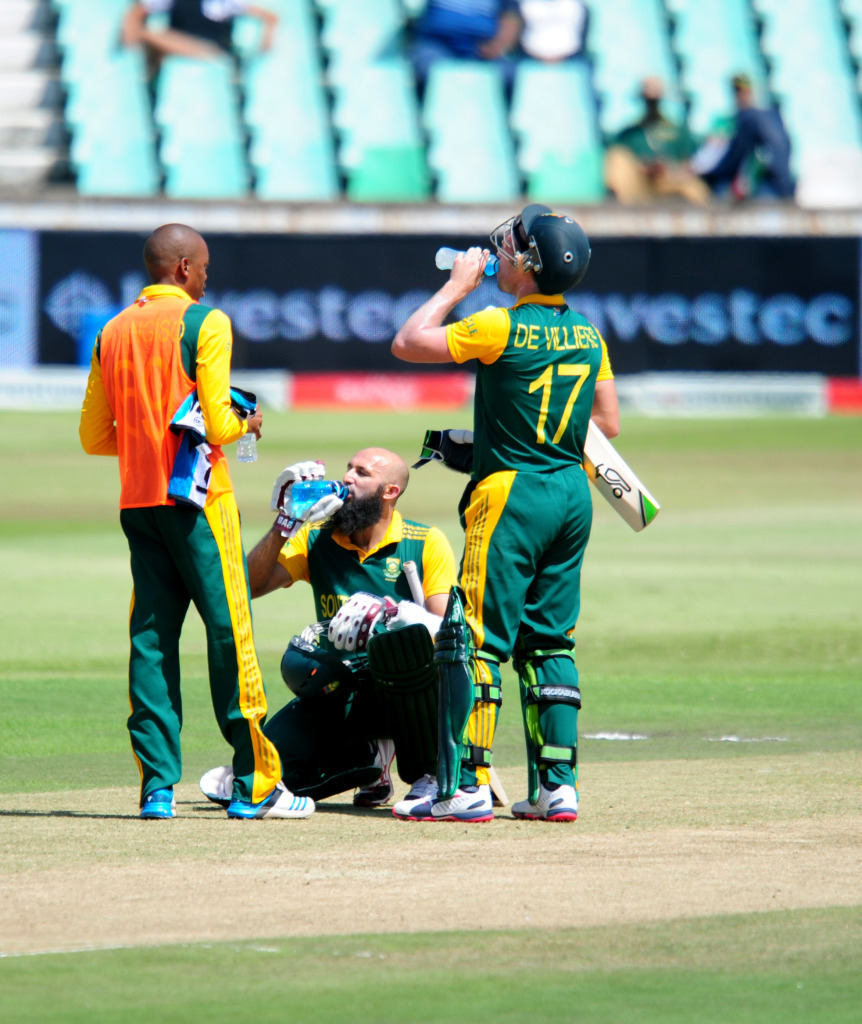South Africa’s build up has been first class and everything a public demands from a champion team – on and off the field.
The Proteas crushed the West Indies in a ODI series. The highlight was captain AB de Villiers’s scoring the fastest ever ODI century at the Wanderers.
De Villiers currently is the best ODI batsman in the game, and many are of the opinion he is the best batsman to have ever played international ODI’s. He also features favourably in opinion as being one of the best batsmen ever, regardless of the game’s format.
De Villiers is popular in South Africa, as popular in Australia and even more popular in India because of his exploits in the Indian Premier League T20 series, where he famously hit Dale Steyn for 27 runs in one over.
De Villiers said he got lucky against Steyn, who in turn could only applaud the outrageous stroke play of his ODI captain and Test colleague.
Steyn has been the best fast bowler in the world for the past five years and along with Allan Donald is the finest fast bowler to have played for South Africa.
His record, as an international bowler, is as imposing as De Villiers’s is as a batsman.
De Villiers is liked. Steyn is liked. So too opening batsman Hashim Amla, who also captains the Test side.
Amla is already regarded as one of the finest to have played Test and his ODI statistics compare with Sachin Tendulkar and Viv Richards.
Amla commands respect because of his ability as an international batsman. Those, who play the sport at the highest level, those who report on the game and those who follow the game passionately regard him as the ultimate ambassador for a game so tainted in the last 20 years because of match fixing and corruption.
Amla is gentlemen royalty in a sport desperate to find a saint among the many sinners. He is deeply religious and his virtue is his humility as a person, his work ethic as a player and his modesty, as a player and a human being.
He is the calm in a sport that in South Africa will forever be tarnished because of the late Hansie Cronje’s match fixing implosion.
Cronje, as the Proteas captain at the 1999 World Cup, was the stereotypical tough and uncompromising South African sporting leader on the field, but he divided opinion, internationally and within South Africa because of a perceived arrogance and self-centred approach that put the player before the game, his team mates and the millions who are the game’s spine as a support structure.
Cronje, as an international batsmen, had limitations that were excused because of his fight as a leader but he proved morally flawed in the sport’s greatest corruption and illegal match fixing expose.
Cronje’s fall to illegal Indian bookmakers crushed the illusion of the Proteas’ purity as an international newcomer, post the country’s 1991 international cricket return after 20 years of enforced isolation.
Cronje betrayed his own morality and the game’s ethos of cricket being a game of ethics and played by gentlemen with moral fibre.
South Africa, as a sporting nation, was crushed. Those who invested in the patriotism of national players were left to ponder if it was ever again possible to unconditionally believe in the integrity of South Africa’s cricketers.
He was a disgraced leader, accused of trading in his national blazer for a patched leather jacket and the money of illegal betting syndicates.
Cronje, as the Proteas captain, trumpeted a value system based on integrity but his actions were an insult to his teammates and supporters of the Proteas.
South African cricket was a mixture of chaos and contradiction post the Cronje scandal.
Former Proteas captain Graeme Smith – among the successors to Cronje – restored integrity to the leadership and with Smith at the helm South Africa became the first team to simultaneously be ranked No 1 in all three formats of the game.
But despite a batting Test average of 49, and a winning record without comparison in the history of Test cricket, Smith’s bullishness and youthful bravado proved more an alienation than an alignment with an insecure and injured South African cricketing public, who saw too much villain when the results spelt victor.
Smith’s tenure was one of grudging respect but there was never the romance there is with De Villiers and Amla.
It’s this romance that ensured the Proteas the greatest ever team departure for Australia.
Patriotism trumped perspective and what should have been a party rich in anticipation of the possibility of the Proteas being good enough to win a first World Cup became a party exclusive to expectation that the Proteas, with De Villiers, Amla and Steyn, would win it.
De Villiers, as captain, attempted to calm the frenzy that had already turned the goal of a tournament win into a given.
He spoke of the Proteas not being the favourites and of respecting the quality of several other teams, and he qualified the belief within the squad was based on a belief of each other’s talent.
It is all he could say because results and recent match statistics don’t support the prospect of this being a World Cup that is South Africa’s to lose.
The Proteas will have to play consistently better than at any stage of the last 18 months if they are to win the World Cup because the very same squad that crushed the West Indies in South Africa have lost 13 matches out of 23 against the Top Teams in Pool A since 2013, one of whom the Proteas are likely to play in the quarter-finals.







